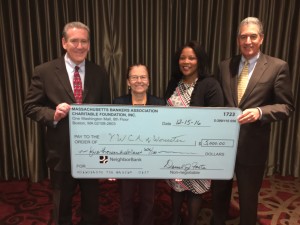
The Massachusetts Bankers Association (MBA) Charitable Foundation presents a $5,000 check to the YWCA of Worcester. Pictured, from left: Robert J. Paulus Jr., president and CEO, Clinton Savings Bank; Linda Cavaioli, executive director, YWCA of Worcester; Tanya Duncan, director, management development; and Daniel J. Forte, president and CEO, MBA. Photo courtesy of the MBA.
From collecting canned goods to putting hammer to nails, Massachusetts’ banks and credit unions play an instrumental role in supporting their community nonprofits – and they say that no hand up is too small.
The Massachusetts Bankers Association, for example, established its charitable foundation in 1996 for the purpose of making grants to nonprofits across the commonwealth during the holiday season. Since its inception, the foundation has given away about $2.2 million, said President Daniel Forte. This year, the foundation will make 37 grants totaling $155,000.
That’s a drop in the bucket compared with what the industry gives statewide. Forte estimates that Massachusetts banks give about $63 million annually to nonprofits in their communities.
Eastern Bank is an excellent example. Eastern established its current foundation in 1994 and in 1999 made the decision to donate 10 percent of its net income to charities annually, said Nancy Stager, executive vice president of human resources and charitable giving. Since then, the foundation has grown its principal to about $89 million and has funneled about $100 million to Massachusetts charities.
“Our giving guideline is to do many small donations, as opposed to a few large donations. We like to say yes more often,” Stager said. “We’ve found over time that small donations are very important. I was the president of a nonprofit here in Lynn for a long time and I got see firsthand what $1,000 can mean in terms of what it takes to run a program.”
Don’t forget about credit unions: the Cooperative Credit Union Association rallies Bay State credit unions every year for an annual donation to the Massachusetts Coalition for the Homeless. Though the association organizes the donation, it’s actually made on behalf of Massachusetts credit unions, said Donna Bevilacqua, the association’s director of communications and community relations. Last year, that donation totaled $110,000, but she said the association hopes to top that figure this year.
And Digital Federal Credit Union in Marlborough incorporated its own 501(c)3, DCU For Kids, in 2005, spokesman John LaHair said. Since its inception, the foundation has given more than $6 million to charities benefitting children, including the Boys and Girls Clubs of Massachusetts and New Hampshire and local hospitals.
Giving Deliberately
“If you’re more deliberate in giving, I think you tend to have a foundation,” Forte commented.
And with good reason. Setting up a charitable foundation isn’t a simple process, said Barbara Freedman Wand, a partner at Day Pitney LLP who advises individuals and businesses on trusts and estate and philanthropic planning.
First, you need to set up an entity, a trust or corporation, as the basis for the foundation and then apply to the Internal Revenue Service for approval, which is necessary if contributions are to be deductible for income tax purposes. The IRS is likely to take several months to act on it, and after that point, the foundation has to register with the attorney general of the state in which it’s headquartered and the foundation must file annual returns with the IRS.
In spite of the hurdles, there are a number of benefits to establishing a charitable foundation as a vehicle for giving money back to the community. For instance, a company can funnel more money into the foundation during a particularly profitable year without having to necessarily give away all of those funds that same year, Wand said.
A bank or other business that’s interested in setting up a charitable foundation also needs to understand a few rules.
“Many transactions are prohibited between a charitable private foundation and donors and other disqualified persons,” including people who serve on the board or as managers of the foundation, she said. A donor cannot lease property (other than rent-free) or lend money (unless it’s a no-interest loan) to the foundation, for instance.
“All of these prohibited transactions are meant to get at abuses where foundation funds might be used for the benefit of private individuals,” Wand said.
In some ways, Wand said, businesses have a greater flexibility in giving to charities than individuals because they also have a marketing budget through which they can make deductible donations as a business expense.
“Some organizations will come forward with a philanthropic benefit, and that typically will go through our charitable foundation. But if there’s a sponsorship opportunity that benefits the community but carries a lot of advertising weight, that might be something we’d fund out of the bank,” said Karen Marryat, chief marketing officer at Blue Hills Bank.
The bank’s support for the YMCA is a fine example. Blue Hills Bank might sponsor a gala or event out of the bank’s budget, but contributions for, say, capital improvements would come from the foundation.
“We find corporate giving to be a way we can very actively partner with people in our communities. It’s important to us,” Marryat said. “We give not only financially, but many of us volunteer on boards and for various organizations throughout the commonwealth and we think that’s a really important way of giving back.”
She’s also particularly proud of the bank’s financial literacy efforts, including a financial literacy-themed musical that’s been delivered to more than 40,000 schoolchildren across Massachusetts. Marryat said Blue Hills Bank hopes to add a program covering fraud prevention for senior citizens.
Indeed, you can’t have a discussion about how community financial institutions give back and only mention money. Massachusetts’ bankers and credit union professionals give of their time, expertise and advocacy efforts, as well. For instance, Stager said that Eastern’s 1,950 employees gave about 50,000 hours of their time to nonprofits this year, and she noted that the bank has been a vocal advocate on a wide range of social justice issues, from protection of transgender people in public places to increased support for veterans.
“I don’t know what things we’ll be doing next year,” she said. “But we have enough corporate courage to use our voice for good.”




 |
| 



